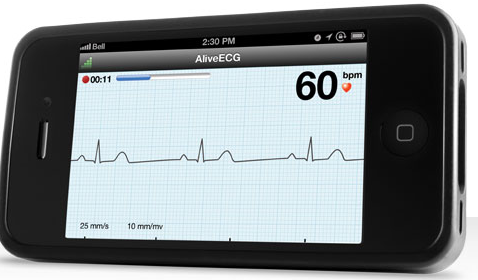Mobile Technology, miniaturization and remote diagnostics have driven creative minds in healthcare to come up with some truly wonderful medical apps and devices. But I have a wish list! One product is already created, one is [sort of] on the way and the third is not quite there yet.
Mobile Technology, miniaturization and remote diagnostics have driven creative minds in healthcare to come up with some truly wonderful medical apps and devices. But I have a wish list! One product is already created, one is [sort of] on the way and the third is not quite there yet.
One product that I think is truly amazing and (I think) a huge step forward for healthcare is the AliveCor Heart Monitor (image from AliveCor) I interviewed Dr David Albert about this product and in the interview, he actually demonstrated how the heart monitor worked. By just placing 2 fingers on an iPhone (it’s not yet available for Droid, otherwise I would have bought one), you can get a simple EKG of your heart to either store or send to your doctor. I find this totally amazing. Eric Topol has one and actually used it twice while traveling. The first time, he had a pilot make an emergency landing as the person he had monitored with the AliveCor heart monitor was having a heart attack. The second time, the person was in atrial fibrillation and he stayed with the patient and calmed him until the pilot landed 90 minutes later.
Currently, the AliveCor Heart Monitor is only available for iPhone and only with a prescription from a physician. Dr Albert expects the over-the-counter version of the heart monitor to be out mid 2013.
The third product on my wish-list is a mobile X-ray scanner that would scan and take x-ray pictures with a mobile
I did read of a team at the University of Texas at Dallas led by Kenneth O, Ph.D., professor of electrical engineering, that has designed a chip that could enable the camera on a mobile phone to see into the human body.
An article in TechNewsWorld by Peter Suciu states:
“This advancement is possible because of developments in CMOS (Complementary Metal-Oxide Semiconductor) technology, which serves as the basis for most electronic devices today. Coupled with the terahertz development, this could create medical devices the size of a mobile phone. The researchers at the University of Texas see a potential for this technology to be used in place of X-rays.”
Currently, privacy concerns have limited development of this product, but the team is still working on the idea.
While researching this idea for a mobile scanner, I did come across another creative individual with the same idea. Watch this [fake] YouTube video to get an idea of what a future mobile scanner would look like!
I had a lot of fun researching for this post. It is amazing what is out there already and what innovative, truly amazing things are being researched. My first wish-list product is available and I will bet that within 5 years, the other two will be on the market also.

